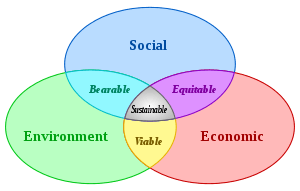Ecopsychology
Ecopsychology is a therapeutic technique and ideology that tries to treat people psychologically by bringing them spiritually closer to nature.[1] Ecopsychology is outside conventional psychology.[2] A central premise is that while the mind is shaped by the modern world, its underlying structure was created in a natural non-human environment.[3] It seeks to expand and remedy the emotional connection between humans and nature, and promote sustainability.
History
Theodore Roszak is credited with coining the term "ecopsychology" in his 1992 book The Voice of the Earth, although a group of psychologists and environmentalists, including Mary Gomes and Allen Kanner, were independently using the term to at the same time. Roszak, Gomes and Kanner later expanded the idea in the 1995 anthology Ecopsychology. Two other books were especially formative, Paul Shepard's 1982 volume, "Nature and Madness," which explored the effect that our diminishing engagement with nature had upon psychological development, and David Abram's 1996 The Spell of the Sensuous: Perception and Language in a More-than-Human World. The latter was one of the first books to bring phenomenology fully to bear on ecological issues, looking closely at the cosmo-vision (or the traditional ecological knowledge systems) of diverse indigenous, oral cultures, and analyzing the curious effect that the advent of formal writing systems, like the phonetic alphabet, has had upon the human experience of the more-than-human natural world. [4][5] Roszack mentions the biophilia hypothesis of biologist E.O. Wilson; that humans have an instinct to emotionally connect with nature.[2][6]
Beliefs
Roszak states that an individual's connection to nature can improve their interpersonal relationships and emotional wellbeing. An integral part of this practice is to treat patients outdoors.[2] According to ecopsychology humans are meant to take walks in parks. It considers the psyche of non-humans to be relevant. It examines why people continue environmentally damaging behaviour, and motivates them to adopt sustainability.[2]
Ecopsychology tries to develop beneficial emotional bonds with nature.[1] It claims a bad connection with the environment is partially behind psychological problems. The belief is that if a person is disconnected from nature, this negatively impacts aspects of an individual's life.[2] Ecopsychology rejects the scientific method and the existence of genes, because that implies evolutionary theory, which is seen as ideologically undesired. Science is dismissed as insufficient in describing nature in terms of wildness, spirituality and emotion.
See also
References
- Anderson, G. "About eco-psychology".
- Roszack, Theodore (1 January 1996). "The nature of sanity". Psychology Today. Retrieved 8 March 2012.
- Roszak, Theodore (1995). "A new therapy [Letter to the editor]". BioScience. 45 (1): 3. doi:10.2307/1312526. JSTOR 1312526.
- Abram, David. The Spell of the Sensuous: Perception and Language in a More-than-Human World. Pantheon, New York, 1996.
- Vakoch, Douglas; Castrillón, Fernando, eds. (2014). Ecopsychology, Phenomenology, and the Environment: The Experience of Nature. New York: Springer-Verlag. ISBN 9781461496182.
- Wilson, E. O. (1995). The Biophilia Hypothesis. Island Press.
Further reading
- M. Day. Ecopsychology and the Restoration of Home. 1998. The Humanistic Psychologist.Vol. 26. Issue 1-3.
- T. Roszak. The Voice of the Earth: An Exploration of Ecopsychology. 1993 Touchstone, New York.
- T. Roszak, M.E. Gomes, A.D. Kanner (Eds). Ecopsychology, restoring the earth healing the mind. 1995 Sierra Club Books, San Francisco.
- Renée G. Soule, "Ecopsychology" in Nigel Young (editor) The Oxford International Encyclopedia of Peace. 2010, Oxford University Press, Oxford.
- A. Fisher. "Radical Ecopsychology: Psychology in the Service of Life" 2013 Suny Press, Albany.
- J. Phoenix Smith, "Ecopsychology: Toward a New Story of Cultural and Racial Diversity" 2013. Journal of Ecopsychology.Vol. 5. No.4.
- Jeremy D. Yunt. "Jung's Contribution to an Ecological Psychology," Spring 2001. Journal of Humanistic Psychology. Vol. 41, No. 2.
